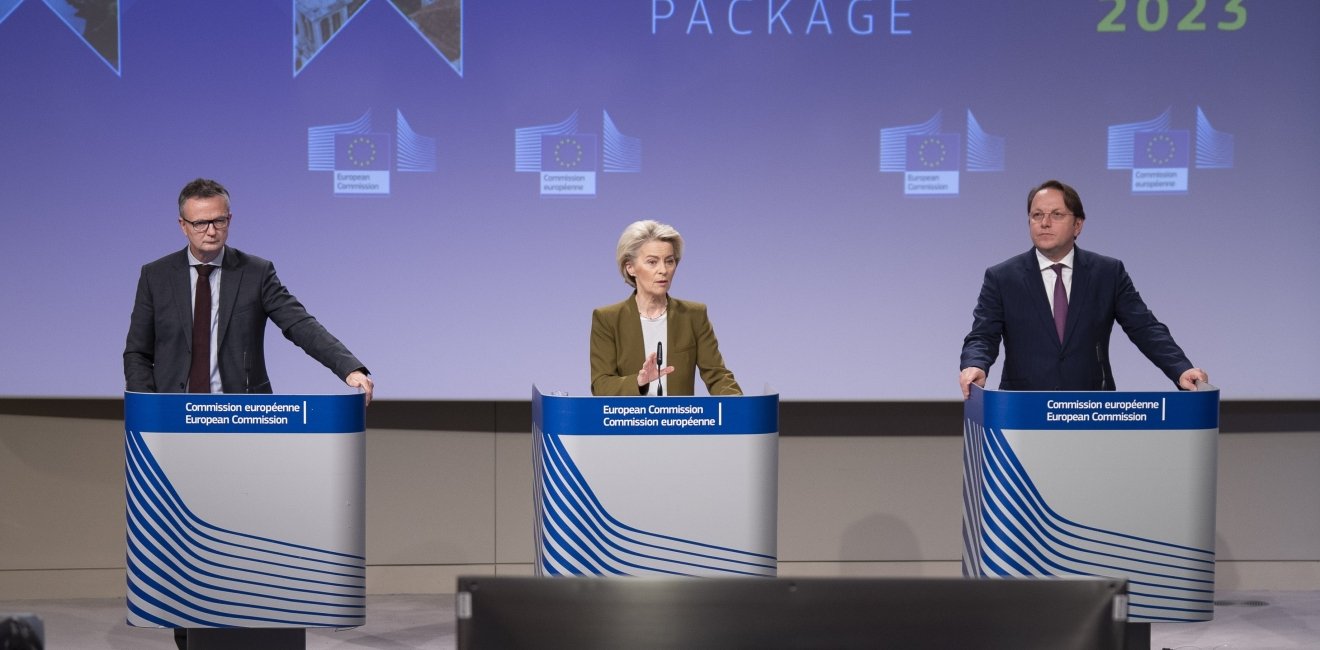Since Ukraine received its candidate country status last June, there has been much discussion on its membership prospects. Yesterday, the European Commission released its 2023 enlargement package—reports on the state of play of the enlargement process for all EU candidate countries. For Ukraine and Moldova, the release of this year’s enlargement package report has been highly anticipated. It is the first official assessment of their progress since receiving the candidate status. The good news: the European Commission has recommended opening accession negotiations for both. To the surprise of some, the Commission also recommended eventual opening of negotiations with Bosnia and Herzegovina – but after the country meets several conditions. Finally, the Commission recognized Georgia’s EU aspirations by granting it candidate status. These reports are an important milestone for assessing the viability of Ukraine’s future in the EU, however, this is only one of many steps to follow, and not a guarantee for membership.
Ukraine applied for membership four days after Russia launched a full-scale invasion on its territory—followed by Moldova and Georgia. The urgency of the conflict revived the EU's enlargement policy that had been dormant in the last decade. Only three months later, the European Commission recommended Ukraine and Moldova to receive candidate status, with the European Council granting it on June 23, 2023. For many this was a crucial step in the EU's commitment to Ukraine’s fight for independence and future in Europe, but for some it sparked a broader debate on the EU’s capabilities to deliver on such a commitment.
Since then, the EU has been working closely with Ukraine and Moldova to ensure meaningful progress. A week before the release of the progress reports, European Commission President von der Leyen visited Kyiv again. Addressing the Ukrainian parliament, she commended the members for “the breadth and depth of the reforms” Ukraine has passed and expressed confidence “for the historic decision to open the process of accession negotiations to be taken already this year.”
The 2023 report on Ukraine doubles down on affirming the country’s progress. Ukraine has successfully completed by adopting necessary judicial, anti-money laundering, and media law reforms. More efforts are needed in combating corruption and the influence of oligarchs, as well as ensuring the protection of national minorities. Moldova also made significant progress,, including substantial reforms in public administration and financing, civil-society inclusion, and fighting organized crime. The Commission recommended opening the accession negotiations for both. But it is conditional, as both Ukraine and Moldova have made progress but still have to adopt certain reforms required for membership, before the negotiating frameworks can be finalized in March 2024.
All eyes are now on December, when the European Council is expected to confirm–the opening of the accession negotiations for Ukraine and for Moldova. While Ukraine has seen unprecedented unity from the EU, recent months have again exposed fault lines in EU foreign policy. Hungary’s Prime Minister Orban has called for a new strategy on Ukraine, and together with the new Slovakian Prime Minister Fico continues to block additional military and financial support. Furthermore, enlargement will significantly impact the EU’s decision-making, policies, and budget distribution. Several member states are therefore calling for “a different Europe for dealing with enlargement”, requiring internal reforms before fully integrating new member states. As much as there is support for enlargement, all these factors will play a role in reaching a unanimous decision in December, as well as in assessing Ukraine’s accession progress further down the road.
Going further, managing expectations is essential to maintain the credibility of the enlargement process. The experience of the Western Balkans is a case in point. After years of accession negotiations, no country in the region is yet prepared to join the EU. Ending the war in Ukraine will not automatically result in Ukraine’s EU membership. However, even without the looming security imperative, the resolve needs to remain high on both the EU and candidate sides to carry out, recognize, and ultimately reward progress.








